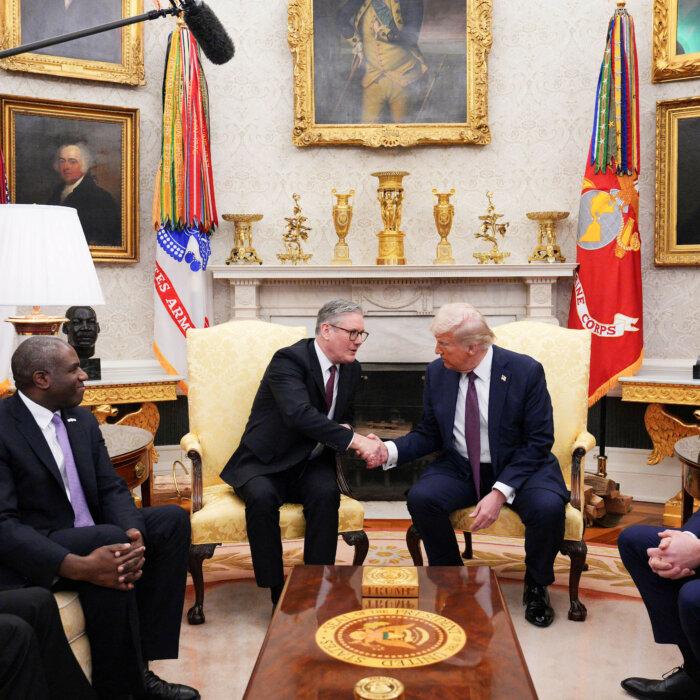Prime Minister Sir Keir Starmer has announced that Britain is committed to securing an economic agreement with the United States to avoid a potential trade war, emphasising that UK policy will be guided by the national interest.
Responding to the global tariff hikes unveiled by U.S. President Donald Trump on Wednesday, Starmer acknowledged that the UK’s baseline 10 percent tariff rate will “clearly” have an impact, but insisted the government is “fully prepared” for this development.
He called for a “cool and calm” approach, stressing that Britain maintains a “fair and balanced” trade relationship with the United States.
The United States remains Britain’s top trading partner, accounting for 17.2 percent of total UK trade. The relationship is broadly balanced, with trade in surplus, compared to countries like China with whom the United States runs a trade deficit of $295.4 billion.
As a result, China and other nations deemed “worst offenders”—including Vietnam, Cambodia, and the European Union—are facing significantly higher reciprocal tariffs than the UK.
Beginning April 9, these levies will be set at 54 percent for China, 46 percent for Vietnam, 49 percent for Cambodia, 36 percent for Thailand, and 20 percent for the EU.
Reactions From Political Leaders
While the government may view the UK’s lower tariff rate as a diplomatic success, opposition parties have criticised Labour for failing to prevent the levies and for being slow to engage in trade negotiations.Lib Dem leader Sir Ed Davey urged ministers to form a “coalition of the willing” with Commonwealth and European partners to push back against Trump’s tariffs, including through retaliatory measures and new trade agreements.
Meanwhile, Reform UK leader Nigel Farage acknowledged that while the 10 percent tariff from the United States is “bad news,” it remains preferable to the 20 percent rate faced by EU countries.
Speaking to Parliament on Wednesday, Business Secretary Jonathan Reynolds stressed the government’s plans to secure a deal that defends the UK’s domestic industries from the impact of U.S. tariffs in a “measured and proportionate” way.
“We have a clear destination to deliver that economic security for working people. We are progressing a deal that can do that,” he said.

Trade Distortion in Northern Ireland
Unlike the EU, which last month announced countermeasures on a range of American goods, the UK has so far opted to withhold retaliatory action.On Wednesday, the government confirmed it will seek views from businesses over the next four weeks on products that could potentially be included in any UK tariff response.
Reynolds said the consultation, which runs until May 1, is a necessary step to ensure the UK “keeps all options on the table” as it continues trade talks with Washington.
The UK’s position is further complicated by the unique trading arrangements in Northern Ireland, which remain partially aligned with EU customs rules under the terms of the post-Brexit deal.
If the EU proceeds with retaliatory tariffs and the UK does not, it could create a two-tier pricing system for American goods, where imports to Northern Ireland are taxed under EU measures, but those to the rest of the UK are not.
He urged Westminster to protect Northern Ireland’s interests and ensure its place in the UK internal market is “fully safeguarded.”
In Brussels, the European Commission has yet to formally announce a new wave of tariffs, but said it is preparing countermeasures should negotiations with Washington fail.
“I agree with President Trump, that others are taking unfair advantage of the current rules. And I am ready to support any efforts to make the global trading system fit for the realities of the global economy,” she said.

UK Businesses Respond
British businesses and industry bodies have expressed deep concern following the White House announcement.UK Steel, which saw a 25 percent tariff on British steel introduced last month, warned of ongoing damage to the sector.
The group’s Director General Gareth Stace called for “bold, decisive and significant interventions” from the government, urging ministers to strengthen the UK’s domestic trade defences.
Make UK, the manufacturing trade group, said the tariffs risk dismantling long-standing transatlantic supply chains and harming both UK and U.S. economies.
“This isn’t the time for a trade war,” said Make UK CEO Stephen Phipson, calling for a tariffs taskforce to support businesses through the uncertainty.
The UK car industry has warned that manufacturers will be unable to absorb the cost of new tariffs. The Society of Motor Manufacturers and Traders said American consumers are likely to face higher prices on iconic British brands, while UK producers may be forced to scale back production amid weakening demand.
The British Chambers of Commerce (BCC) urged the government to stay the course in negotiations but cautioned that the economic consequences will be far-reaching.
“Orders will drop, prices will rise, and global economic demand will be weaker as a result. This is a lose-lose situation for everyone,” said BCC Director General Shevaun Haviland.
The BCC advised businesses to begin direct talks with U.S. customers to manage the tariff impact and explore alternative export markets such as the EU and CPTPP countries.







